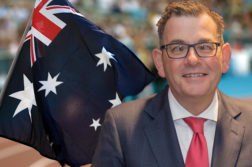Kevin Rudd doesn’t care about disenfranchised majorities. Or does he. Does he? You’ll have to excuse me – John Howard dominated my entire adult political life, and since the Ruddslide, I have to admit to feeling a little disorientated.
Eight frenetic months into Australia’s new allegedly progressive era, I went looking for appraisals of what we can expect from the new Government, based on what we’ve seen so far. You wouldn’t expect figures as disparate as Ed Coper, Campaign Coordinator of prominent activist group GetUp!, and Noel McCoy, President of the National Young Liberal Party, to agree on much – would you?
"Obviously I’ve got my partisan view," says McCoy, "but I don’t feel they’ve achieved that much. They’ve touted a lot – they signed the Kyoto Protocol, made the apology to stolen generations. These are announcements, they’re symbolic and important to people, but they don’t have much impact. My position on Kevin Rudd is that he’s pretty flaky, and his Government is too."
It’s more than your predictable rivalry though. Coper, says, "[Rolling] out viable strategies is not just an issue of the Coalition still controlling the Senate. We’ve seen [things that are]politically and practically easy ticked off." Press reporters, too, are losing patience with what The Age columnist, Paul Daley, calls "a Government that behaves like it’s still in an election campaign".
"Labor is only now appreciating the difficulties of being in government," says Coper. "There’s a broad base of interests in Australia and you can’t please everyone all the time."
Despite warning that there are "no foregone conclusions" when it comes to taking on the new Government, Coper seems at least willing to allow Labor some slack: "So many groups felt marginalised under Howard, there’s a long queue now wanting to campaign the Government, and to be fair, seven months isn’t a long time to address that, especially for a leader sensitive to being seen as a solid economic manager."
McCoy, on the other hand, sees this sensitivity as Labor’s greatest weakness: "On a host of issues, Rudd agreed with Howard’s policy: like Howard, Rudd advocates economic conservatism. Ninety-two per cent of the Coalition’s October 2007 tax plan was copied by Labor. They only tweaked tax cuts for the highest income tax brackets. Rudd has mimicked Howard on defence and even industrial relations. Now we have a situation where the policy of Australian Workplace Agreements is effectively still in place, but under a different name."
It’s these key issues that are sticking points, not just for groups as diverse as GetUp! and the Young Libs, but on the central question of a viable progressive government delivering on its ideals.
Some might find it strange to hear someone like McCoy giving voice to concern which might be expected from groups on the other end of the political spectrum. "What Labor did was project themselves as different on a couple of key issues. [But] they’re often difficult to differentiate, mainly because the Labor Party has come across to the Liberal Party position on so many issues."
McCoy continues: "[Rudd and team] have built a good brand with those who identify with social justice. We say that’s about marketing more than any substance."
Of course, some of McCoy’s criticisms adopt a more familiar partisan tone: "Rudd is playing the politics of envy, reverting to an old style that differentiates the so-called haves and have-nots. I’m seeing a policy direction very different from the Liberals, which rewarded and encouraged opportunity … Entrepreneurs ought not be punished for their success."
In spite of his inconsistency about how different or similar the ALP is to the Coalition, McCoy is correct to point to the can of worms Labor has opened as they attempt to divide the middle class on issues such as the Baby Bonus, and who "deserves" Government assistance.
Coper says Labor "seemed primarily concerned with maintaining this honeymoon period, but political leadership is [now]required".
GetUp!’s statistics show that 55 per cent of Australians polled nationwide before the apology to the stolen generations supported the apology one week before, but 68 per cent supported it the week after. Coper says this 13 per cent bump is indicative of how a nation can be led with purpose by a strong leader with an agenda – cue images of Rudd blitzing his way through those famous "first 100 days in office."
Coper and GetUp! are now concerned by Labor’s moves to expand the Coalition’s Northern Territory interventions. "At the time of the apology, indigenous Australians felt very included, but now there are fresh concerns and the suspicion that things will carry on without change," says Coper. "Pensioners and those with disabilities haven’t seen the changes they would expect either. In terms of climate change, GetUp! would rather see decisive moves and strong leadership, not equivocation."
Coper says the climate crisis will not be sold by a government timidly bound to polls and popularity ratings. "We’re not optimistic of that level of boldness coming through because we haven’t seen it yet, and time is of the essence."
McCoy disagrees. "Carbon trading will be the undoing of the Rudd Government, effectively imposing a new tax which will have a huge burden on business, and the results will be too much for the Rudd government to handle." McCoy, however, does add that he would "prefer the Liberal Party embrace renewable energies in a bigger way." GetUp! has been pressuring the government on this issue, with their Fuel Watch campaign and recent controversial primetime advertisement: "Mr Rudd. Mr Nelson. Make our future f***ing renewable."
If the issue is about leadership, as Coper suggests, rather than an error in core values, as McCoy suggests, Rudd will have to shape his persona as something more than an amiable and diligent pubic servant. Howard once faced a similar leadership problem, and subsequently carved out an image of toughness at the expense of the gun lobby, "illegal" refugees, and other minority groups.
That doesn’t bode well for the Government. Rudd has already been forced to cut into the cost of living just to exert the necessary economic downward pressure the Reserve Bank is demanding. Up until recently he has had reasonable success blaming this situation on global economic conditions and the policies of his predecessor.
But will Rudd be able to pull off strong leadership when its tough consequences will be worn by the very "working families" that put him in the top job?
If, however, he is to honour his environmental pledges on carbon emissions targets and trading schemes, as well as follow through on education and other social justice issues, surely, as Coper implies, strong leadership will be needed to trump a currently unknowable level of economic strain.
Coper and McCoy might be waiting for different things from the Rudd Government but they do firmly agree on one point: the public is paying attention.
Political parties don’t allow for individual political complexities, says Coper, but with new technology freeing up people’s involvement in these issues, GetUp! is finding the Australian public repoliticised in droves. McCoy echoes this sense of renewed determination: "We’ve experienced a spike in membership since the election. The message is: you can’t take being in government for granted."
Donate To New Matilda
New Matilda is a small, independent media outlet. We survive through reader contributions, and never losing a lawsuit. If you got something from this article, giving something back helps us to continue speaking truth to power. Every little bit counts.



